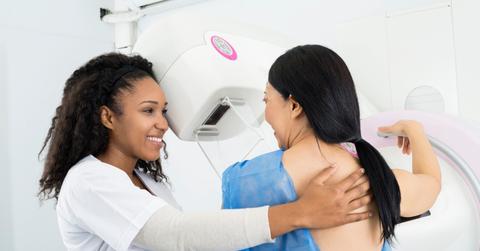New Guidelines Recommend Women Start Getting Mammograms at Age 40, Not 50

New guidelines from the U.S. Preventive Services Task Force recommends women start getting mammograms every other year starting at age 40, 10 years earlier than previous recommendations, which encouraged women to start getting mammograms at age 50.
The new recommendations are for people assigned female at birth who are at an average risk of breast cancer.
“In this final recommendation statement, we are also urgently calling for more research that will allow us to build on our existing guidance and help all women live longer and healthier lives,” the task force wrote in the guideline announcement. “Specifically, we need to know how best to address health disparities across screening and treatment experienced by Black, Hispanic, Latina, Asian, Pacific Islander, Native American and Alaska Native women.”

Breast cancer is the second-leading cause of death for women in the United States, according to the American Cancer Society. The task force, which is an independent volunteer panel of national experts, had previously recommended that women in their 40s make an individual decision with their clinician on when they should start getting mammograms based on their health history.
According to the task force, Black women are 40% more likely to die from breast cancer than White women. These new guidelines are designed to ensure Black women start getting screened for breast cancer at age 40 as a step toward improving health inequities.
The updated guidelines apply to women who are at an average risk of breast cancer, as well as those who have a family history of breast cancer and who have dense breasts. It does not apply to people with a personal history of breast cancer, who are at very high risk due to genetic markers or have a history of high-dose radiation therapy to their chest at a young age.
Mammograms And Reducing Risk Of Death
A mammogram is an x-ray of the breast that can often find breast changes that could be cancer years before physical symptoms develop, according to the American Cancer Society. Women who have regular mammograms are more likely to have breast cancer detected earlier, are more likely to need less aggressive treatments, and are more likely to be cured, according to the American Cancer Society.
According to the Susan G. Komen Foundation, women ages 50-59 who got mammograms had a 14% lower risk of dying from breast cancer, compared to those who didn’t get mammograms. That percentage is significantly higher in women ages 60-69, who had a 33% lower risk of dying compared to those who did not get mammograms.

Mammograms For Women At High Risk
Women who are at high risk for breast cancer are those who have a 20 to 25% lifetime risk based on family history, having genetic markers or mutations or have a first-degree relative with the genetic mutation. Additionally, women with dense breast tissue have a higher risk of breast cancer, and dense tissue also makes it more difficult for radiologists to identify abnormal tissue.
Most women at high risk should begin screening with both mammograms and breast MRIs at age 30, according to the American Cancer Society.
Breast cancer disparities among Black women
Black women are statistically more likely to have diabetes, heart disease, obesity and are less likely to breastfeed after childbirth, which are all risk factors for breast cancer, according to the Breast Cancer Research Foundation. They are also more likely to have inadequate heatlh insurance or access to health care facilities, which could impact their ability to get regularly mammograms or other screening tests.
Black women are also disproportionately affected by more aggressive types of breast cancer, such as triple-negative breast cancer, which tend to be more advanced when diagnosed.






